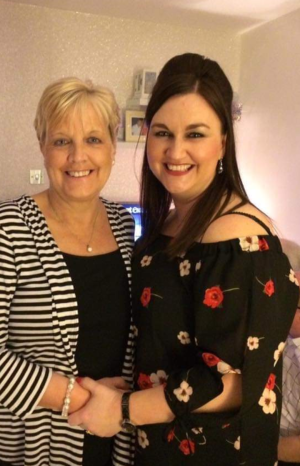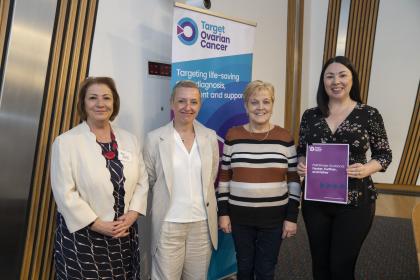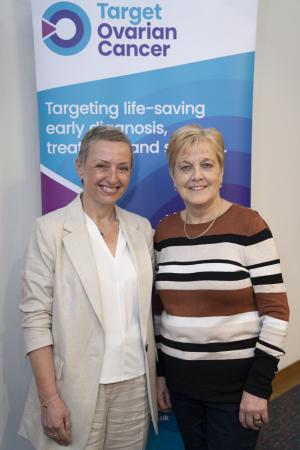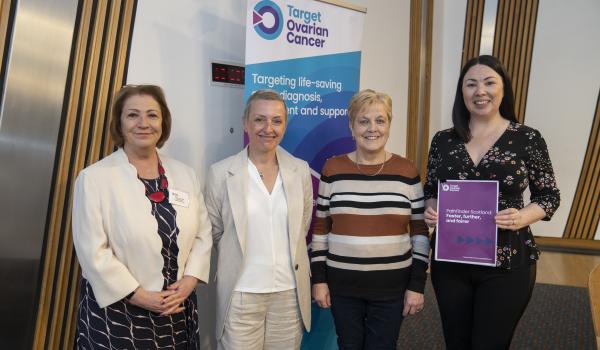In 2007, at 57-years-old, I was diagnosed with triple negative breast cancer. I had radiotherapy, chemotherapy and then surgery which was successful. Although it left severe nerve damage I just got on with life doing the things I enjoy, reading, going on holiday and seeing friends and family.
Hindsight
It wasn’t until 2019 that I was diagnosed with stage 3c ovarian cancer. Looking back now, I had all the symptoms: persistent bloating, tummy pain, needing to wee more often and feeling full quickly but I put it down to getting older.
I didn’t know these symptoms were linked to ovarian cancer – I’d never seen any leaflets or articles displaying these signs.
Hearing that I had cancer again really took my feet from under me, as I was someone who was very healthy and looked after myself.
I started chemotherapy in the April and it was during this time that my doctor put the two diagnoses together. They suggested I had genetic testing to see if I had a gene variant which increased the risk of cancer and could be inherited by my three daughters.
The agonising wait to know my daughters’ futures
Waiting for the results was awful, I worried about whether the girls would have the variant and what that would mean for them. It was stressful and took a huge toll on me.

This was compounded by a delay in my surgery due to a lack of surgeons able to perform it. Despite this, my family gathered round me and gave me the courage that I needed.
I had five rounds of chemotherapy until a surgery date became available – which was at the end of August. The week before my operation, I found out I carried a variant in the RAD51D gene. I was in complete shock, as were my daughters who made it their business to find out everything they could about the gene variant as there wasn’t much information at the time.
While they waited for their test results to come back, we found out that the gene variant meant a 5-25% risk of developing ovarian cancer. Two of my daughters had negative results whilst one, Julie, had a positive result. She had a preventative surgery, a hysterectomy. in the January that followed, due to previous history with polycystic ovary syndrome.
My treatment was successful and although I was grateful, the aftermath of knowing that I had given my daughter this gene was awful. It caused me great pain.
Recurrence with no access to surgery where I lived
Then came the horror of fighting for my life, again, as in 2021 I was diagnosed with a recurrence and was told there was no surgery available to me.
Recurrence surgery wasn’t being done in the whole of Scotland. This diagnosis deeply affected me, more so than the first diagnosis.
I felt totally abandoned by the Scottish health care system. It left me very frightened about what would happen to me and my family.
My only option was to travel to Imperial College Healthcare Trust in London. This was the only option to save my life. And it was at my own financial cost.

Although I was able to have the surgery in London, I had to fight for NHS Scotland to pay for it. I have since been able to reclaim everything I spent. It will never undo what was done. Everything about that fight was horrendous and it has left me with such horrible memories. It traumatises me to this day. I often have sleepless nights.
Campaigning for equality
Sadly, I know I'm not alone and many other women in the West of Scotland have had a similar experience to me. It shouldn't matter where you live as to what treatment you get. We should all have access to the surgery we need.
This is why I decided to set up a support group in Scotland, so every woman with ovarian cancer has the lifesaving operation they need and better access to treatment.
Together with Target Ovarian Cancer, I hope we can change the future for women in Scotland and improve access to surgery.
I initially became involved with the charity when I had my recurrence and needed help and support, which I recommend to anyone with a diagnosis or gene variant.
Since then, my daughter Audrey has run the Great Scottish 10K and raised money for Target Ovarian Cancer to help the charity achieve its aims.
Go to the website and find read the information or call the support line. You're not alone and there is help and understanding out there for you.

If you’ve been affected by this story and would like to speak to a specialist nurse, you can call our dedicated support line on 020 7923 5475 or contact us: [email protected]. We're open from 9am until 5pm, Monday to Friday.
If reading this story has helped you, join the Ovarian Cancer Community to connect with more people affected by ovarian cancer: www.targetovariancancer.org.uk/onlinecommunity



